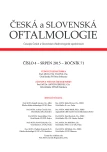-
Medical journals
- Career
Evaluation of the Clinical Results of Implantation the Hydrophobic Intraocular Lens CT LUCIA 601P
Authors: A. Stepanov; N. Jirásková; P. Rozsíval
Authors‘ workplace: Oční klinika Fakultní nemocnice, Hradec Králové přednosta prof. MUDr. Pavel Rozsíval, CSc., FEBO
Published in: Čes. a slov. Oftal., 71, 2015, No. 4, p. 196-198
Category: Original Article
Práce byla přednesena na sjezdu Futurum Ophthalmologicum, Lázně Bělohrad 16. května 2015.
Overview
Purpose:
To evaluate the properties and clinical outcomes after implantation the new hydrophobic intraocular lens CT LUCIA 601P in patients undergoing routine cataract surgery.Material and Methods:
The study included 38 patients (43 eyes), mean age 70 ± 8 years (range 56–91 years) with senile cataract. After phacoemulsification intraocular lens CT LUCIA 601P was implanted. Patients were evaluated at 4 months after surgery. We assessed uncorrected visual acuity (UCVA), best corrected visual acuity (BCVA), refraction, keratometry and the incidence of posterior capsule opacification (PCO – Posterior capsule opacification).Results:
Before surgery the mean UCVA was 0.3 ± 0.18 and four months after surgery was 0.7 ± 0.15. The mean BCVA before surgery was 0.58 ± 0.21 and after surgery was 0.94 ± 0.08. PCO value was 0.199 ± 0.05, that means minimal incidence of PCO.Conclusion:
The new hydrophobic intraocular lens CT LUCIA 601P could be easily implanted and after surgery shows a high degree of biocompatibility in patients undergoing routine cataract surgery.Key words:
intraocular lens CT LUCIA 601P, posterior capsule opacification, OSCA
Sources
1. Aslam, T., Niall, P., Christopher, R.: OSCA: a comprehensive open-access system of analysis of posterior capsular opacification, BMC Ophthalmology, 2006, 6 : 30.
2. Bosc, JM.: Initial impressions and early clinical results of a new single-piece hydrophobic yello acrylic IOL, presented at The ASCRS Symposium on Cataract, IOL, and Refractive Surgery, San Francisco, 2009.
3. Jirásková, N., Rozsíval, P.: Metody hodnocení zkalení zadního pouzdra po operaci katarakty, Čes a Slov Oftal, 2004, 60(2): 155–157.
4. Maedel, S., Hirnschall, N., Chen, YA., Findl, O.: Effect of heparin coating of a foldable intraocular lens on inflammation and capsular bag performance after cataract surgery, J. Cataract Refract Surg, 2013, 39(12): 1810-1817.
5. Pozlerová, J., Nekolová, J., Jirásková, N., et al.: Hodnocení opacit zadního pouzdra u různých typů umělých nitroočních čoček. Čes a Slov Oftal, 2009, 65(1): 12-15.
6. Rosca, G.: High Precision Injection with a New Heparin Coated Hydrophobic One Piece IOL, presented at ASCRS, Chicago, 2012.
7. Stepanov, A., Jirásková, N., Nekolová, J., Lackovič, J., Románek, J., Rozsíval, P.: Evaluation of the clinical results of implantation the hydrophobic-hydrophilic intraocular lens ERIFLEX 877 FAB, Čes a Slov Oftal, 2013, 69(6): 236–238.
8. Žemaitiené, R., Jašinskas, V., Barzdžiukas, V. et al.: Prevention of posterior capsule opacification using different intraocular lenses (result of one-year clinical study), Medicina (Kaunas)., 2004, 40(8): 721–729.
Labels
Ophthalmology
Article was published inCzech and Slovak Ophthalmology

2015 Issue 4-
All articles in this issue
-
Osmolarita slz u pacientů s těžkým syndromem suchého oka před a po aplikaci autologního séra.
Porovnání s hodnotami zdravých dobrovolníků -
Treatment of Unilateral Amblyopia.
Comparison of Methods CAM and CRCS Color Reversal Checkerboard Stimulation of Retina - Evaluation of the Clinical Results of Implantation the Hydrophobic Intraocular Lens CT LUCIA 601P
- Treatment of Macular Oedema due to retinal vein occlusion with OZURDEX
- Surgical Treatment for Idiopathic Epiretinal Membrane
- Exenteration of the Orbit for Basal Cell Carcinoma
-
Osmolarita slz u pacientů s těžkým syndromem suchého oka před a po aplikaci autologního séra.
- Czech and Slovak Ophthalmology
- Journal archive
- Current issue
- Online only
- About the journal
Most read in this issue- Surgical Treatment for Idiopathic Epiretinal Membrane
- Treatment of Macular Oedema due to retinal vein occlusion with OZURDEX
-
Treatment of Unilateral Amblyopia.
Comparison of Methods CAM and CRCS Color Reversal Checkerboard Stimulation of Retina - Exenteration of the Orbit for Basal Cell Carcinoma
Login#ADS_BOTTOM_SCRIPTS#Forgotten passwordEnter the email address that you registered with. We will send you instructions on how to set a new password.
- Career

